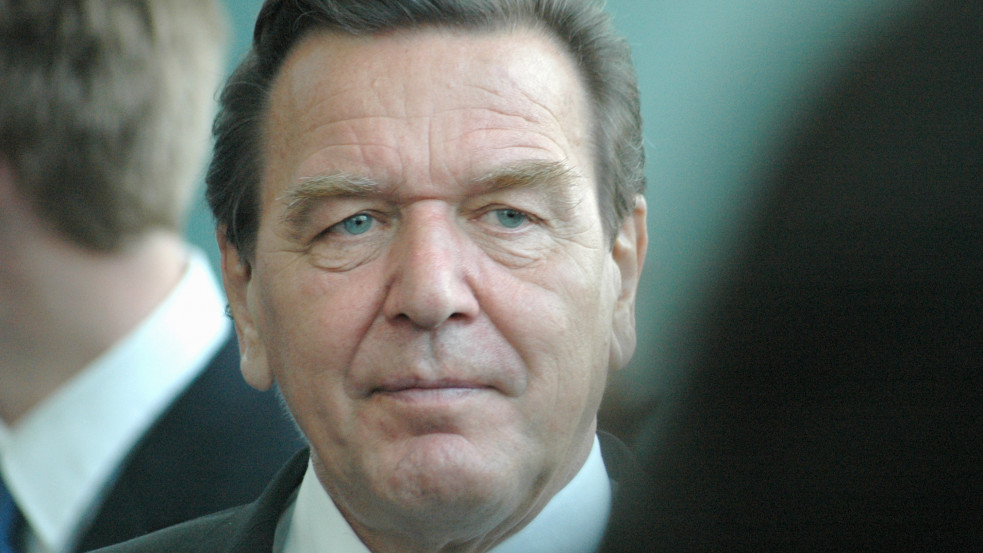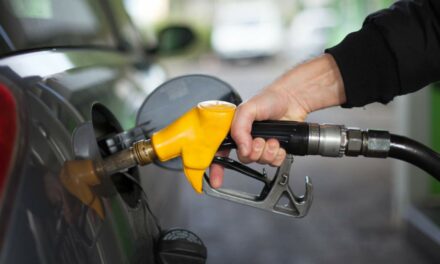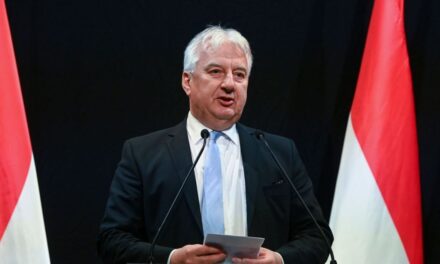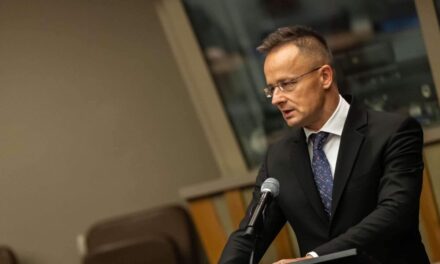Viktor Orbán and Gerhard Schröder met at the peace summit in Vienna, where the former German chancellor stated that he thought the German and French leaders should follow Orbán.
Peace in Europe - with this title, the conversation between Prime Minister Viktor Orbán and former German Chancellor Gerhard Schröder, a kind of "peace summit", was organized by the Swiss Weltwoche in Vienna's Sofiensäle. The conversation was moderated by Roger Köppel, the owner-editor-in-chief of Weltwoche, who has been regularly reporting on Hungary for a long time, and who also accompanied the prime minister to the peace mission at the beginning of the summer. Yesterday, in an interview with oe24, one of Austria's most read online media, Köppel called the fact that Viktor Orbán is Putinized because of his pro-peace position as part of the demented debate culture.
***
Little mouse, elephant, goulash, Putin
At the beginning of the conversation, Köppel inquired about the relationship between his two interlocutors, who came from completely different corners of European politics. Orbán said, "I'm going to say old-fashioned things, I don't know if the word respect is still fashionable here . He said that he and Schröder were colleagues, "if the elephant and the little mouse are considered colleagues next to each other", and that "respect binds me to Mr. Chancellor, not only respect for the elder, but also professional respect" , since
Schröder was able to do two things that no one has done since.
(During the conversation, it later turned out that these two things were the creation of European strategic autonomy and the rescue of the German economy.) And Schröder said of the Hungarian Prime Minister: "we always had a good relationship, I was in Budapest a lot and with great pleasure, and especially I fondly remember the goulash". He also indicated that he and Orbán were connected by the fact that they both knew that it is important for Europe to maintain a fair relationship with our great neighbor, Russia. As an anecdote, Orbán also told that one of the failures in his life was connected to Schröder:
since Hungary was the most advanced of the Central European countries in the process of EU integration, he wanted to convince them that the former socialist countries should be taken in individually, not in groups.
"The chancellor rejected this. He told me to look at the map: it is impossible that Poland is not in the first group of enlargement. Therefore, the expansion will happen in groups. I had fantastic counter-arguments, none of them worked”
said Orbán.
After that, Köppel inquired about how they cope with the fact that both of them are strongly attacked in European politics these days. According to Schröder, you have to be able to rise above the attacks, and Orbán agrees that "it is important that people are loved, but I have a wife, four children, six grandchildren, I have someone to love." Besides, having grown up in the anti-communist resistance in the 1980s, he is used to having the power against him: "there was almost never a time in my life when the wind was blowing from behind," he said.
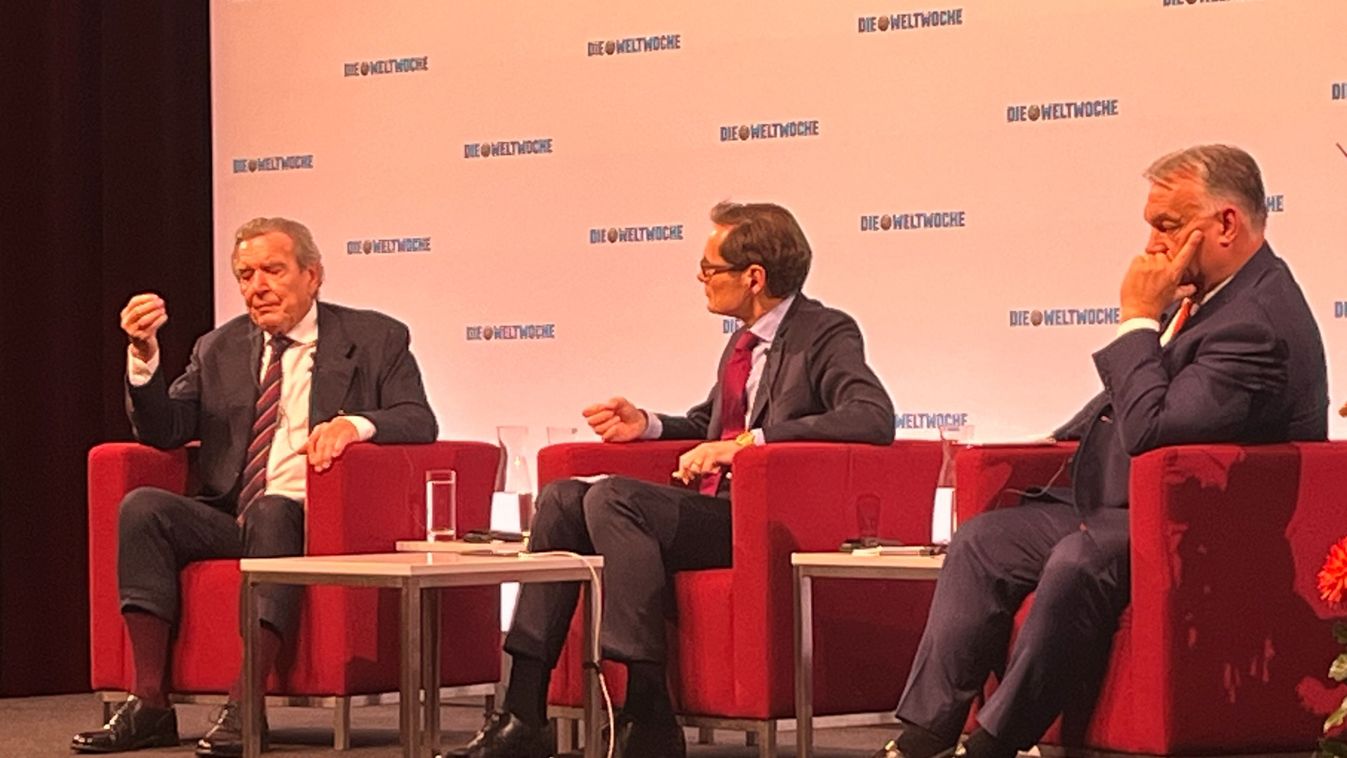
Photo: Mátyás Kohán
How will there be peace here?
Köppel then moved on to the main topic of the conversation, the war in Ukraine, and asked whether they see it as possible for the war to end in the foreseeable future. Viktor Orbán said: "Today, Emmanuel Macron is running a long way by talking about the strategic autonomy of Europe, but Gerhard Schröder already did this twenty years ago" , when he managed to stay out of the Iraq war. Today, however, the situation is that "one should be optimistic:
We cannot trust Europe at all, Europe can create war today, but not peace".
According to him, our only hope is that "from across the big water" Donald Trump will bring, if not peace, at least a ceasefire.
Gerhard Schröder told us: after the start of the war, he was involved in a peace attempt, and was approached from Ukraine via Switzerland to see if he would be willing to mediate with Vladimir Putin. "I had it checked first to see if it was a joke, and it turned out to be serious," he said. At that time, two important questions arose regarding the end of the war in Ukraine: the issue of Donbass, which mostly raises cultural issues, for example, that it was a mistake that the Ukrainian parliament abolished the country's bilingualism. Then the question of NATO membership arose, as well as the question of Ukraine's security in the event that it renounces its NATO perspective.
Schröder would have seen it right if the UN Security Council, supplemented by Germany, gave security guarantees to Ukraine,
And Ukraine is generously restoring bilingualism in the Donbass. At the same time, he sees it as: it is difficult for politicians who are no longer in office to gain adequate access to those politicians who are in office, so in the end he did not become the mediator, but the Turkish president; "I don't want to speculate on how other great powers were involved in this". He said, however, that "I thought it was great that Viktor Orbán tried to act in this direction", and that France and Germany should have tried not only to deliver weapons, but also to connect this with a diplomatic offensive.
Peace mission experience report
On the occasion of the peace mission, Köppel also inquired whether Russia would still be willing to enter into a peace that was offered in the framework of the Istanbul peace negotiations outlined by Schröder that year. Orbán said: he has seen the documents of the peace talks being mediated by Turkey, so he knows how
there was a proposal on the table that could have been the basis for a cease-fire and peace negotiations",
And Schröder "politely omits to mention a key player in this story, which is the Prime Minister of the United Kingdom, who, according to legend, intervened in this process and made the deal impossible." Boris Johnson said about the role of former British Prime Minister,
"Historians will write whether this was exactly the case, but let's record that in April 2022, thanks to Chancellor Schröder, we were close to achieving at least a ceasefire".
He said about the peace mission: he thought a lot about what to do with the EU presidency. He said that he could have handled this in a bureaucratic way, "hundreds of meetings have to be held, and if you do this well, the bureaucrats in Brussels will give you a good pat on the back, and that was the point of the presidency, so that nothing happens." According to him, at the same time, with "belonging to the Christian-democratic world" comes a responsibility, something must be done if people are killing each other at the front. "We got a tool in our hands, we are the presidents in a row - what could be more important than doing something for peace?" asked Orbán. He also said that
before the peace mission, he asked the opinion of several leading European politicians, who "said, go, try".
According to Orbán, he then made a plan: he will go to Kiev and Moscow and try to convince the two warring parties to realize that "time works for the other, so it is better for everyone if we make a ceasefire now" . He told Zelensky in July that the situation would be much worse by September - to which the Ukrainian president responded by saying "no, they will win" . And the Russian president said that he is the one who stands to win, and in the event of a ceasefire, will he receive a guarantee that the opponent will not use the ceasefire to improve the positions of the military resistance? Since he was of course unable to give such a guarantee, he failed to persuade the parties concerned to agree to a ceasefire. That's why he changed his strategy:
tried to create an international public opinion that would force the warring parties to make peace.
That is why he went to Washington, Beijing, and then to President Trump in Mar-a-Lago, and he tried to get the European leaders behind the strategy, to whom he also wrote a letter. According to him, the idea was supported by both the Chinese and the Turks; And Trump said that
"he is a man of peace, if he wins, we can count on him". However, the Europeans "rejected the proposal to create a peace camp with the Chinese and Turks, which would put the warring parties under pressure."
Orbán sees it as: "It is a very sad story that the Europeans, who have the most interest in peace, did not understand that it is not their job to take the side of the war and win the war in Ukraine" , which is impossible. As he said: "I couldn't convince any major European country of this".
"Is there a word in German for having a fight?" asked Orbán,
according to whom the European leaders "quarreled: they want to defeat Russia, that's what they have in mind". According to the Prime Minister, "the key role in this is played by the wife of the President of the European Commission, she goes in front, she carries the flag", and everything that points in the direction of peace is considered treason and anti-democracy.
Is Vladimir Putin an imperialist dictator?
After that, Köppel wanted to turn to whether the Russian president is an imperialist dictator who is only trying to take the first step towards the domination of Europe in Ukraine.
In response to this question, Viktor Orbán stated:
"the situation is getting worse, the Europeans have lost this war".
"I don't know what is being written in the German and Austrian press, but I have never seen a sane military analyst who would say that Ukraine could win this war on the front," he said. "The question is when we will agree. The situation will only get worse every day," said the Prime Minister, who does not want to moralize about "what lasting peace can be like, and whether Putin is an imperialist, these are irrelevant circumstances" ; the important thing is that "we lost a war" , to which the sane answer is a ceasefire.
He also spoke about: "a war in which there is no communication between the opposing parties is very rare.
That Europeans are proud of not talking to Russians is diplomatic barbarism.”
According to him, this sends a message to the Russians, as it did to Germany in the Second World War:
“we will go until we exterminate you, until we take everything. However, we obviously do not want to occupy Moscow. Or yes?”
Gerhard Schröder stated: the central issue of the war is that, since it is taking place in Europe, "especially the great European powers should follow Viktor Orbán" . If a European peace initiative does not come from France or Germany, it will be "difficult to implement" . However, Europe must come up with a peace initiative, America will not be interested in this issue. He states that the intervention of the two European superpowers is necessary if only because "the public administration of the EU - because it is not much more than that - cannot be persuaded to actively support such a process" . Schröder would not think about whether Putin is an imperialist, "I am not a psychologist" . According to him, the Russian president is more interested in "keeping Russia as a whole" and protecting it from attacks from outside, whether they are of a military or economic nature.
"The idea that we shouldn't also talk to the president of Russia about establishing peace is absurd. Who else should I talk to anyway?
After all, what they are trying to do to force Russia to make peace with arms shipments to Ukraine has never been successful in history" . According to him, it would also be necessary for the leading European powers not to always talk only about "who should win and who should lose" , but to try to get into a dialogue with Putin, "who also knows exactly how pointless this war is". Schröder also noted that while he would be unlikely to vote for Trump, he is undoubtedly "the only one of the current candidates who has announced that America will contribute to peace under his leadership."
Europe is hokedlin, seal fat and McDonald's
Viktor Orbán also made it clear that "Hungary cannot achieve results on its own; we achieved the results that could be achieved, because today we are talking about peace in Europe. It was not even possible to talk about this in front of the Hungarian presidency." "It's nice, but not enough. If we want more, we need the Germans and the French," concluded Viktor Orbán. He told me that he had recently visited the German Chancellor and the French President and told them both that
"with all due respect, but hurry up, contact the Russians",
and "not secretly, but publicly" , otherwise "a man named Donald Trump will come, win the election, and he will immediately negotiate with Putin, and we Europeans will be sitting on the hokedlin, stokin." Orbán also opened a parenthesis at this point: according to him, Europe's current demographic problems stem from the fact that Europeans exterminated each other during the world wars. He asked the audience: if they don't see "some tragic absurdity" that "in the war of two Christian European countries, people are killing each other in heaps, while on the other side we allow people from foreign cultures into Europe. Is it logical?”
The prime minister also talked about how, since he lived 26 years under Soviet occupation, he still knows Russians "from the time when they were called Soviets by their maiden names", unlike other European leaders currently in office.
I don't see the depth of thinking about Russia of the European leaders in office today",
since they grew up in the happy west, he said. According to him , "The understanding of Russia as an intellectual problem is present among European leaders. How should you approach it? The consideration of this is completely lacking" . He said: in his interpretation, Russia is a Christian country and part of Europe, but it is different from us, because the focus of their political thinking is not, as in Europe, "how we can give our citizens the greatest freedom in the greatest prosperity" , but that "how can such a huge country be held together" so that it neither falls apart nor "its edges are torn off by enemies in the east, west, and south". "If we understand this, then we know how to do politics with the Russians," Orbán said. He explained: Russians speak the language of strength, "because their country is not held together by freedom, but by strength." Therefore, in negotiating with them , "you have to be rich, you have to have military strength, you have to have political leadership, because they always have it" . In the latter respect, we were unlucky, Trump was not the president and the German chancellor was new - that's why what happened happened.
At this point, Köppel questioned whether Trump would be the one who would be able to provide the intellectual depth necessary for this and be able to negotiate with Russia in such a way "so that the Russians don't put him in their pocket" . Orbán said: he spoke with President Trump this afternoon. "We are getting ready," he said to the delight of the audience. According to him, the Republicans with a chance to win the election have no interest in the war in Ukraine, "they are not interested in Ukraine, but in how to exclude this conflict from world politics". "They're going to do it in one way: they're going to sit down and talk to the Russian president in no time, and they're going to make a Russian-American agreement,
in which it is not clear where our place will be because our European leaders miss the moment".
He sees it as: "strangely, perhaps because of the size, it is not difficult for the Americans to understand the Russians, because the Americans actually speak the language of power.
It is true that there is no seal grease smell of Russian military boots around the Americans, but rather a McDonald's smell, but this does not change the fact that both of them speak the language of power."
According to him, the Americans will come to an understanding with the Russians; "not in a complicated, intellectual way through history, but in the language of power: size, power... there will be real politics. European intellectuals look down on this, but they are wrong. The Americans achieve results, we do not achieve results," he said. He opined: “President Trump will understand Russia just as much as is necessary and make deals. This is my opinion and my hope."
Somebody save Germany!
At the end of the conversation, Köppel tried to focus on what Europe's role will be in the unfolding multipolar world order. Orbán said here:
Of course, we can talk about a multipolar world, but there is a problem here - someone has to save the German economy.
There is a multipolar world, but the reality is that a European company pays four times as much for gas as an American company, and twice as much for electricity. The European economy is doomed at such energy prices." According to the Prime Minister, someone is needed to save the European economy with a new strategy, but "it won't be Hungary, it has to be someone big. You have to be there, not in the multipolar world system."
Gerhard Schröder made it clear that he probably won't be able to save Germany with his eighty years; Köppel's intervention that the age difference is not that great compared to Donald Trump did not convince him either. However, according to him, Germany is not necessarily "in such a state that it needs to be saved" , since they are still Europe's leading economy with a huge medium-sized enterprise sector - a suitable political leadership that does not fight more within the coalition than it fights for the good of Germany would be enough.
The last question concerned the future of Europe. Orbán sees it as: the key to the problem is that "Europe cannot solve its own leadership at the moment, it is a leadership problem" , while America, China, and Russia have stable leadership structures and strong leadership. According to him, European democracy does not produce strong leaders today, not because "the Brussels bureaucrats have taken hold of everything" ( "that's true, but why don't we take hold of them?" asked the Prime Minister), but because it is going through labor pains. European politics. "If we go up to a high point and look at European politics from there - I do this sometimes, I have two thirds of the parliament, I'll get to it -
I see that the traditional structure of European politics, on which European success, European party systems and strong governments were built, is disappearing".
He explained: it refers to the fact that there used to be a left and a right in Europe, and both had strong leaders. Today, however, completely new issues have been put on the agenda, not the issues of capital, work, distribution and fair wages, but war and migration, gender, the future of our children, Muslim-Christian coexistence. "These are not left-right issues," Orbán asserted, in fact: "the traditional European right-left party structure is disintegrating, and something new is being born." According to him, this process must be accelerated in all European countries, but especially in the key countries, Germany and France, the transformation must take place as quickly as possible.
"The new center has already been born in the hearts of the people, but the political elite must now follow and represent it"
Orbán said.
And Gerhard Schröder sees it as: it is necessary to "re-anchor the desire for achievement in the people as strongly as after the war or during the Agenda policy" . He also sees it as important that European leaders dare to make painful but important and useful decisions, even if they might not win the next election because of them.
Sometimes the interest of the people and the country must be more important than the desire for one's own political survival"
– according to Schröder, who believes that this is what makes democratic leadership leadership, and it also distinguishes it from other forms of leadership.
Featured image: Gerhard Schröder/Shutterstock/PuzzlePix

